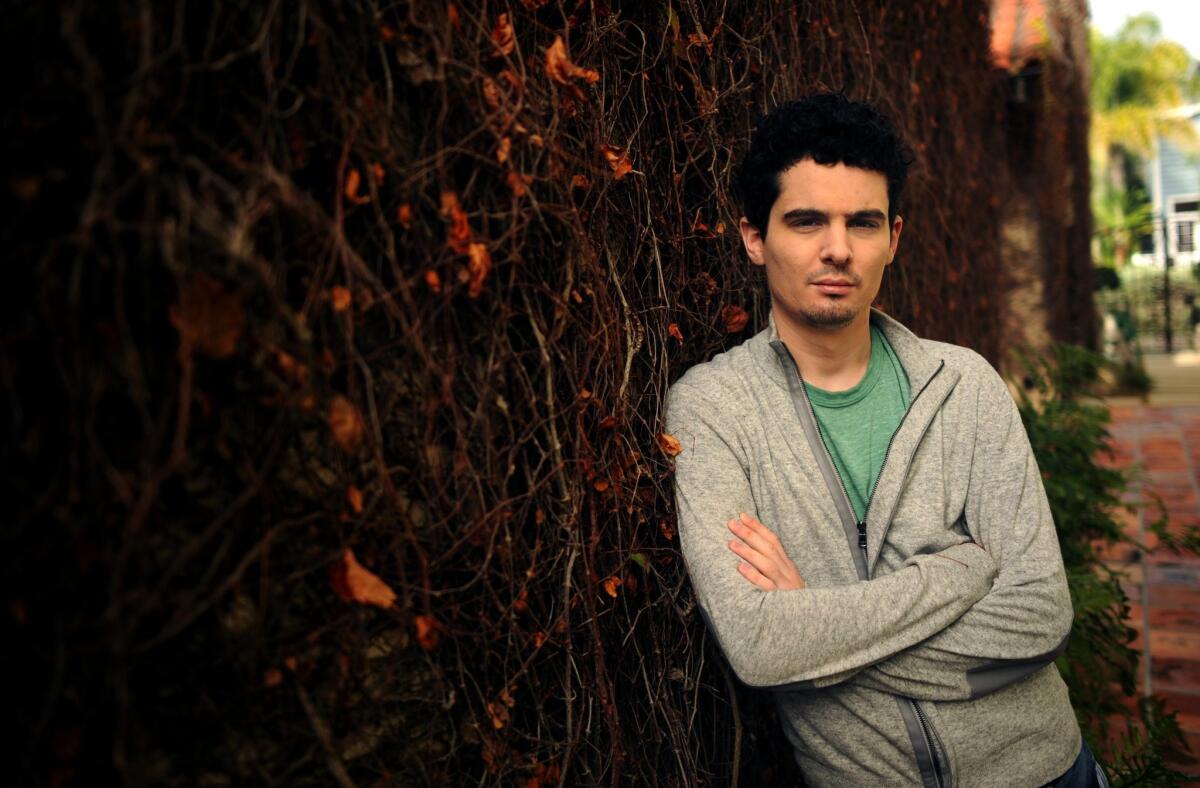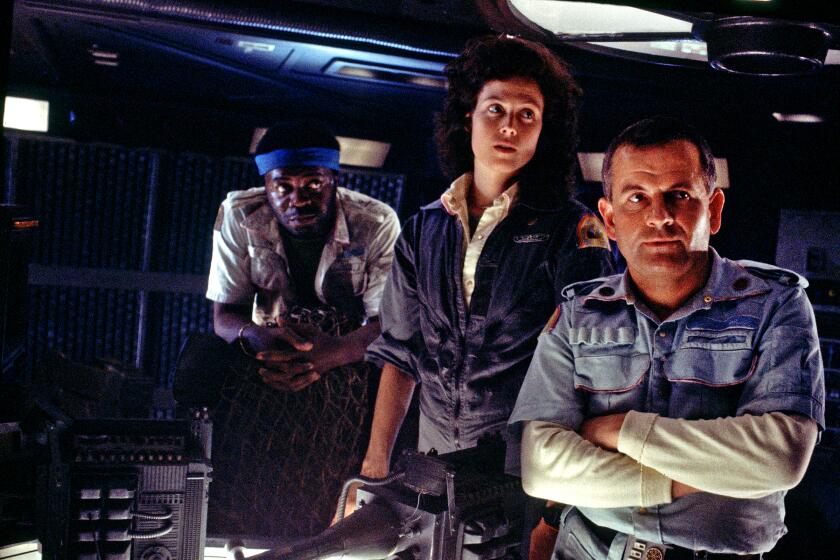Damien Chazelle’s wild, crazy ride to the Oscars with ‘Whiplash’

Damien Chazelle braced himself for disaster.
It was opening night at the 2014 Sundance Film Festival, and Chazelle’s movie “Whiplash” was about to have its premiere in front of a packed house in Park City, Utah. Just six years out of college, Chazelle had written the film — a blistering tale of a young drummer (Miles Teller) under the tutelage of a cruel, manipulative music teacher (J.K. Simmons) — in a sort of fever of frustration after a string of earlier aborted scripts had gone nowhere.
Now, here he was at Sundance with all eyes on him, his stomach in knots, his heart doing paradiddles.
Chazelle — whose only previous directorial effort, a gritty, micro-budgeted black-and-white musical called “Guy and Madeline on a Park Bench,” had been largely unseen — had shot “Whiplash” in 19 stressful, sleep-deprived days. He’d envisioned the picture as a relentlessly intense psychodrama — a kind of first-person war movie — but then, dismayed by how lifeless the first cut felt, had spent desperate hours in the editing room, praying he could make the thing watchable.
The film had come a long way, but Chazelle wasn’t sure how the Sundance crowd would respond. In dark, panicky moments, he imagined half the audience walking out.
He needn’t have worried. The screening was electric. The audience greeted “Whiplash,” which would go on to win the festival’s dramatic grand jury prize and audience award and be picked up by Sony Pictures Classics, with the sort of nearly rapturous enthusiasm that can make a career in an instant. It was almost too much for Chazelle to take in.
“I knew Damien was really nervous, and I remember saying to him, ‘It all changes after this — you’re going to have no problems with this movie,’” recalled Sundance festival director John Cooper. “He was looking at me like I was a crazy person.”
And from there, Chazelle’s year would get only crazier.
Oscar nods
On a recent afternoon, Chazelle sat on the patio outside his home in the Venice Canals area, still trying to process all that has happened since that night.
On Jan. 15 — nearly a year to the day after the Sundance premiere and just four days before Chazelle’s 30th birthday — “Whiplash” received five Oscar nominations, including best picture, supporting actor for Simmons and adapted screenplay. (To help secure financing for the picture’s $3.3-million budget, Chazelle had made a short movie out of part of the screenplay before the feature, so under the film academy’s arcane rules, it was considered an adaptation.)
Almost three weeks later, the nominations, which made Chazelle one of the youngest filmmakers ever to score a best picture nod, were still sinking in. “It feels normal for a period,” he said, “but then you just have those moments where it hits you, and suddenly it’s like you’re in a dream.”
Among this year’s crop of best picture nominees, “Whiplash” is the little engine that could. Despite nearly unanimous critical acclaim, the film has taken in less than $10 million at the box office since its release in October, the lowest gross by a significant margin of any of the contenders, though it has lately been getting a nice post-nomination bounce. To Chazelle, who based the film in part on his own experience as a high school jazz drummer, that it’s in the awards race at all is something of a miracle.
“Before ‘Whiplash,’ I’d had a string of failed scripts,” he said. “I’d pour my blood, sweat and tears into them, and no one would like them. This one was definitely different than anything I’d ever written — it was more autobiographical. But it wasn’t clear it was any better.”
That the film struck a chord has been a pleasant surprise. “I was always worried that something on such a niche subject might not translate to people who were not already into that subject,” Chazelle said. “My intention had always been to make something universal, something that felt like a real ride and a real emotional roller coaster.”
Lanky and baby-faced, with tightly curled jet-black hair, Chazelle gives off the slightly jittery energy of someone who spends a lot of time in his head. “My mind tends to skitter to extremes,” he said. He pointed to the living room where he’d watched the live stream of the Oscar nominations announcement on his laptop, having slept on the couch the night before.
“No matter how much I told myself not to care, I knew I’d be really stressed out — and I was,” he said. “Of course, they save best picture for the end, just to milk the dread. So sadistic.” He shook his head. “I get nervous just thinking about it.”
Since that morning, Chazelle has been out on the awards campaign trail almost nonstop — an endless string of interviews, screenings, awards shows and other press-the-flesh events that actually started back in the fall.
The other night, Chazelle had presented a prize to Simmons at the AARP Movies for Grownups Awards at the Beverly Wilshire Hotel in front of a black-tie crowd that was, for the most part, significantly older than he was. Taking the stage, Simmons — a first-time Oscar nominee at age 60 — cracked, “The irony is not lost on me that this award was just handed to me by a child.”
“It’s interesting,” Simmons said later. “Despite me being just about exactly twice Damien’s age, we’re both rookies at this whole thing.” He paused, then added, “Honestly, I think he may be handling it with more aplomb than I am.” (Simmons has affectionately nicknamed Chazelle “Boy Wonder.”)
As with a politician on the presidential stump for the first time, nothing can quite prepare a newbie for the whirl of awards season. Sitting on the sidelines isn’t an option — you can’t win if you don’t play — but it can be a bewildering and sometimes absurd process. So Chazelle has been grateful to have the experienced hands of Sony Pictures Classics co-presidents Michael Barker and Tom Bernard guiding him through it. “No one knows the Oscar game more than they do,” he said.
For those who know Chazelle, it’s a kick to watch him out campaigning for “Whiplash” in his self-effacing, unfailingly polite way, which contrasts so starkly with the raw, in-your-face nastiness of the movie. “Seeing Damien out on the town is really fun,” said “Whiplash” producer Helen Estabrook. “The cliché is that it couldn’t happen to a nicer guy — and that’s completely accurate in this case.”
Hours before the AARP awards, Chazelle had attended the Oscar nominees’ luncheon at the Beverly Hilton. Sitting beside him at his table was Oprah Winfrey, nominated as a producer of “Selma.”
“It was one of those moments where I was reminded of how weird this whole thing is,” he said. “Oprah was talking to me about being at the luncheon her first time for ‘The Color Purple.’ Bruce Dern was at the next table. Everywhere you looked, there was a legend. And then there are the people like me, kind of deers in the headlights, literally having an out-of-body experience.”
Love for film
For Chazelle, there have been quite a few out-of-body experiences in the last year.
Born and raised in Rhode Island — his father is a French-born computer scientist and his mother a writer — Chazelle dreamed of making movies from the age he was old enough to start watching them. He studied filmmaking as an undergraduate at Harvard, where he met his former wife, filmmaker Jasmine McGlade, then moved to L.A. with “Guy and Madeline on a Park Bench” — his thesis project — as his calling card.
“There was no Plan B,” he said. “My theory was that eventually people give up, and the easiest way to make it here is just to outlast them.”
When “Whiplash” debuted triumphantly at Sundance, Chazelle suddenly found himself being heralded as one of the industry’s most talented new writer-directors. Still, in the festival’s wake, Chazelle — who has a wide pessimistic streak — wasn’t sure how long the buzz would last. So he quickly threw himself into setting up his next movie, a musical called “La La Land” about a young L.A. jazz pianist who falls in love with an aspiring actress.
“I had the sense of a very short-term life span for the movie that I had to milk while I could,” he said. “I kept thinking that stuff would get worse: Reviews would get worse, other festivals wouldn’t respond, and people would be like, ‘Oh, it was a Sundance fluke.’”
In May, “Whiplash” screened at Cannes. Again, Chazelle prepared himself for the worst. (“Cannes scared me because I knew that’s where they booed,” he said.) And again, his fears were unfounded.
“The response at Cannes was just crazy,” Simmons remembered. “I mean, they would not shut up — all through the credits and minutes after the credits. They put the spotlight on us, and we didn’t know what to do.”
In September, “Whiplash” played strongly at the Toronto International Film Festival and won the grand prize at the Deauville film festival in France. The movie began to pick up awards heat. Finally, Chazelle began to accept that maybe things wouldn’t turn out disastrously.
Still, he wasn’t one to start basking in his own glory. “If there’s a good review, I’ll skip over the headline, but I always find the bad reviews and read those,” he said. “I don’t know why. It’s a little sick and demented.”
Now that he’s had a taste of acclaim, Chazelle is trying not to let it mess with his head as he gears up to start shooting “La La Land” in the fall, with Teller once again starring.
“It can be flattering, but it makes you a little nervous the next time you go to bat,” he said. “You suddenly start thinking more about every line of dialogue you write, because you’ve seen what happens when something gets amplified.”
Like many indie directors these days, Chazelle has been courted to make the jump to bigger-budget films, but he’d rather stay focused on his own more personal projects. “I like the idea of working my way up,” he said. “I don’t feel impatient to immediately jump into something that could literally bring down a studio if I don’t do it well.”
For the moment, though, the campaign trail had a few miles to go. In a few days, Chazelle was to fly to London for the British Academy of Film and Television Arts Awards, where “Whiplash” would win three prizes. Then, in just a few weeks, his long, strange trip with “Whiplash” will reach its final destination on Feb. 22 at the Academy Awards, a heady prospect, no matter what the outcome, for a self-described Oscar junkie.
In spite of his tendency to brood and obsess, Chazelle was doing his best to have as much fun through all of this madness as he could. “It makes me stressed out and sometimes depressive, which is annoying, but it’s probably a good quality for my own mental health to know how fleeting stuff can be,” he said. “Nothing is guaranteed to last, so you should just enjoy it as it happens.”
He paused, a sudden look of concern clouding his face. “I’m starting to feel that kind of thing in my throat,” he said quietly. “I hope I’m not getting sick.”
More to Read
Only good movies
Get the Indie Focus newsletter, Mark Olsen's weekly guide to the world of cinema.
You may occasionally receive promotional content from the Los Angeles Times.










